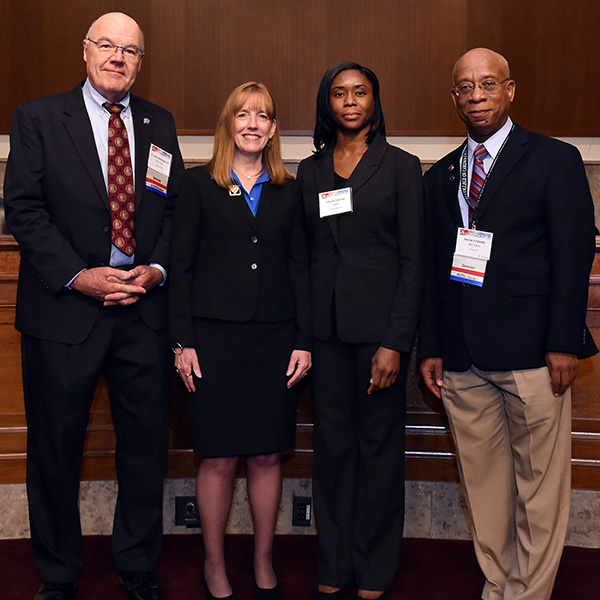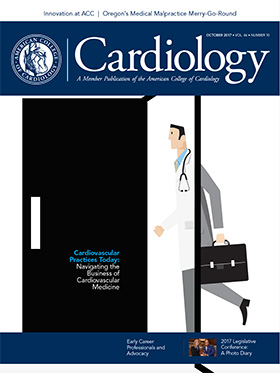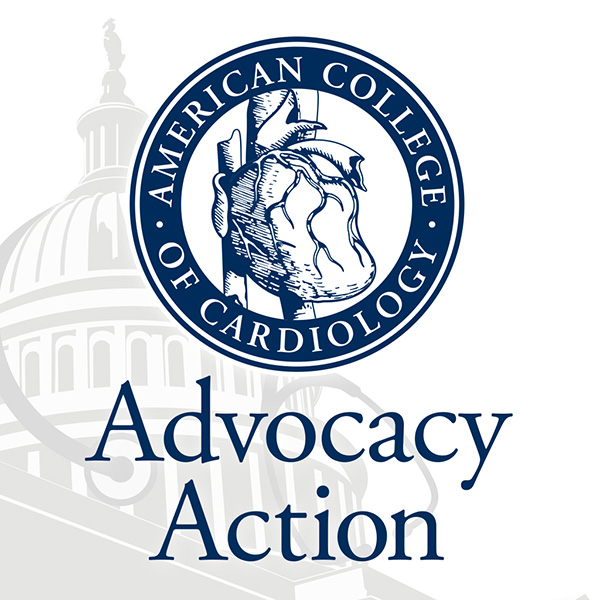From the Starting Line | Advocacy and the Early Career Physician: A Social Obligation to Humanity
 South Dakota Chapter Governor K. John Heilman III, MD, FACC; ACC President Mary Norine Walsh, MD, FACC; Nkechi Ijioma, MBBS, FACC; North Dakota Chapter Governor David J. Clardy, MD, FACC, at the 2017 Legislative Conference.
South Dakota Chapter Governor K. John Heilman III, MD, FACC; ACC President Mary Norine Walsh, MD, FACC; Nkechi Ijioma, MBBS, FACC; North Dakota Chapter Governor David J. Clardy, MD, FACC, at the 2017 Legislative Conference.
September 10-12, 2017: ACC Legislative Conference, Washington, DC. As an early career physician, I wanted to represent my ACC state chapter on Capitol Hill. But there was a problem — as a new employee, I wondered if it would be wise to request time off from work. Clinical practice was busy, work hours were long, and spending a weekend traveling to a meeting — albeit for a good cause — advocacy, needed careful thought. After considerable contemplation, I submitted my email request to my office manager. My request was granted and I became part of the two-person delegation for the ACC North Dakota chapter.
My ACC state governor and I met with one of our North Dakota senators on Capitol Hill. Despite his busy schedule, our senator met with us. He listened to our talking points and provided his views regarding efforts to improve health care access in North Dakota. It was a great meeting. Our talking points included advocating for legislation to ease the administrative burden on clinicians (H.R. 3120), requesting a smooth transition to the Quality Payment Program and increased access to cardiac rehabilitation via supervision by physician assistants, nurse practitioners and clinical nurse specialists (H.R. 1155 and S.1361). These issues are important to me in my clinical practice.
Medical professional societies have identified advocacy as an important role for physicians. The American Medical Association in its Declaration of Professional Responsibility recognizes advocacy as one of the duties and obligations of physicians — a component of the social contract between physicians and society. The American Board of Internal Medicine Foundation identifies public advocacy by physicians as a component of physician commitment to improve access to care.
"In our daily work as physicians, whether in the inpatient or outpatient setting, we routinely advocate for the individual patient. The next step in fulfilling our social obligation to society is to engage in public advocacy."
There are many facets to advocacy in health care. Advocacy usually begins with advocating for the individual patient, and spreads into public or community advocacy. In our daily work as physicians, whether in the inpatient or outpatient setting, we routinely advocate for the individual patient. The next step in fulfilling our social obligation to society is to engage in public advocacy. For the early career physician, there are several hurdles to implementing this next step — establishing a clinical practice and performing regular clinical activities often spares little time for work-life balance, let alone engaging in health care activities outside the workplace. Even when there is a desire to participate in public advocacy, lack of knowledge regarding where or how to begin often prevents early career physicians from engaging in advocacy.
Advocacy is an important arm of the College’s strategic mission. The College’s advocacy priorities include population health and the prevention of cardiovascular disease, innovation and research, quality improvement via clinical data registries and clinical guidelines, value-based healthcare delivery and improved patient access to cardiovascular health care. The ACC encourages all its members to engage in cardiovascular advocacy. To facilitate this goal, the College has developed a number of tools to facilitate ACC member engagement in cardiovascular advocacy. For member education, ACC.org provides articles on current health policy events. Recently, a Medicare Access and CHIP Reauthorization Act (MACRA) education hub was created for member education.
For training in advocacy, there is the Emerging Advocates program. To facilitate the College’s access to health care policy makers, there is the ACC Political Action Committee (ACCPAC). For member engagement with legislators in the workplace, there is the Legislator Practice Visit. Regarding advocacy on Capitol Hill, there is the annual Legislative Conference. The conference is a great opportunity for cardiovascular professionals to network with each other, receive updates on important regulatory changes in cardiovascular medicine and lobby for relevant cardiovascular issues on Capitol Hill. These are a sample of the numerous opportunities for early career members to partner with the College in its advocacy mission.
A wise person once said: “If you don’t ask, you don’t get.” As physician leaders, it is important that we speak up, for our patients and our profession. Start from where you are — in the workplace, and identify subtle opportunities for advocacy. Get involved!
Tweet this article: Tweet
|
|
 |
|
| Click the cover image above to read the latest issue of Cardiology in e-pub format or click here to read it on the web! | |
Clinical Topics: Cardiovascular Care Team
Keywords: ACC Publications, Cardiology Magazine, Consumer Advocacy, American Medical Association, Nurse Clinicians, Quality Improvement, Workplace, Outpatients, Inpatients, Cardiac Rehabilitation, Work-Life Balance, Goals, Lobbying, Health Policy, Societies, Medical, Physician Assistants, Social Responsibility, Nurse Practitioners, Medicare, Health Services Accessibility, Registries, Cardiovascular Diseases
< Back to Listings




